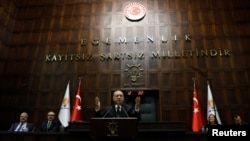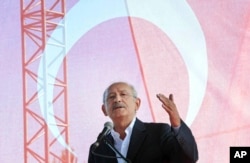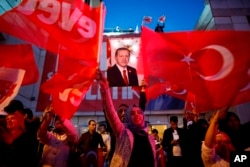Turkish opposition parties are warning that the raft of electoral reforms parliament passed this week pose a threat to free and fair elections.
"They hid the package from the nation. Why? Because the law explains line by line how election fraud can be conducted," Kemal Kilicdaroglu, leader of the main opposition CHP party, said Tuesday after the measures were approved.
The reforms were so contentious that fistfights erupted in the parliamentary chamber among deputies as the articles were approved. The 26 changes include easing restrictions on the presence of security forces in ballot stations, allowing state governors to locate ballot boxes and authorizing security forces to remove ballot boxes.
One of the most contentious reforms is allowing the use of paper ballots that do not have official stamps. Until now, ballots had been issued to match the number of voters, which were then stamped by monitors drawn from all political parties.
Controversial 2017 referendum
The use of unstamped ballot papers has revived the controversial April 2017 referendum on extending President Recep Tayyip Erdogan's powers.
The extension was narrowly approved, but in the middle of vote counting, the electoral body controlling the election allowed unstamped ballots to be included. The decision to accept the votes as valid and the way in which it was implemented was criticized in a report by the Organization for Security and Cooperation in Europe (OSCE) and Council of Europe referendum monitors.
"These decisions undermined an important safeguard against fraud," the report noted.
The use of unstamped ballots in future elections has caused alarm among opposition parties.
"We can say there is very little hope there are going to be fair elections in Turkey, so the election themselves are under question," warned Ertugral Kurkcu, parliamentary deputy and president of the pro-Kurdish HDP party. "Tayyip Erdogan put his hand inside the ballot box. Unless the situation is changed dramatically ... every election is going to be tainted with fraud and the result won't be legitimate."
Voter fraud is of particular concern in Turkey's predominantly Kurdish southeast, the region at the center of a conflict between security forces and Kurdish insurgents.
During the 2016 presidential referendum, HDP party election monitors raised allegations of ballot-box stuffing. Several voting areas recorded 100 percent support for extending Erdogan's powers, even though the area was a stronghold against the president.
Adding to such fears, Turkey remains under emergency rule, which was introduced after the failed 2016 coup.
"The next elections most probably take place under the state of emergency, and the government and the regime will do everything in its power to win all the elections. They will not allow any meaningful elections," political scientist Cengiz Aktar warned.
Ruling party criticisms
Criticism over the latest electoral reforms and fears of fraud have been angrily dismissed by the ruling AK Party and its ally, the MHP party.
Mustafa Sentop, AK Party parliamentary deputy, described opposition party concerns as "ignorant."
The ruling AK Party argued the reforms are aimed at ensuring fair elections and reducing the threat of voter intimidation.
The opposition CHP party, however, said monitoring elections and counting ballots are key elements of creating free and fair elections.
"For the security of the elections, we have already started working to ensure we will have 1 million volunteer observers, which will mean more than one overseer for each ballot box," said Sezgin Tanrikulu, deputy head of the CHP party. "I am still hopeful for a just and honest election. At least we should make sure the results cannot be changed."
The CHP has been frequently criticized by observers for failing to mobilize and marshal its members to properly scrutinize polls.
Already, government supporters have labeled monitoring efforts as subversive and a threat to fair elections.
"The two [opposition] parties' aim is to create a perception among the public that elections are being manipulated by the ruling party, and the results are therefore illegitimate," columnist Mehmet Acet wrote in the pro-government Yeni Safak newspaper earlier this month. He said adding a perception of illegitimacy can instigate a "change in government by nonelectoral means."
Pro-Kurdish HDP party president Kurkcu said, "So what's ahead for Turkey's elections is a very big disagreement on how the vote is carried out. There is going to be a very heated debate in the coming days."
The success of monitoring, especially under emergency rule, in next year's presidential, general and local elections will be key to whether all parties will accept the election's results, experts said.







